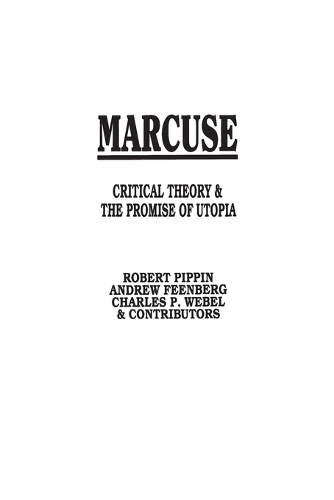
Marcuse: Critical Theory and the Promise of Utopia
(Paperback)
Publishing Details
Marcuse: Critical Theory and the Promise of Utopia
By (Author) Andrew Feenberg
By (author) Robert Pippin
By (author) Charles P. Webel
Bloomsbury Publishing PLC
Praeger Publishers Inc
31st January 1987
United States
Classifications
Tertiary Education
Non Fiction
Philosophical traditions and schools of thought
191
Physical Properties
Paperback
288
Width 152mm, Height 229mm
595g
Description
Distinguished scholars--Jurgen Habermas, Claus Offe, Douglas Kellner, and Martin Jay, among others--draw upon historical, theoretical, and biographical information to assess Marcuse's philosophy, from its grounding in classical German idealism, through the break with Heidegger, to his role in the American counterculture of the sixties and seventies. Indispensable for anyone interested in an in-depth understanding of one of the most burning issues of our time: the relation of critical theory to social action.
Reviews
"provocative essays. . . ." Contemporary Sociology "During the 1960s probably no other living ideologue had a greater impact on U.S. society than Herbert Marcuse . . . prominent Marcuse scholars [examine] the many facets of [his] thought.""-Small Press Book Review
provocative essays. . . ." Contemporary Sociology "During the 1960s probably no other living ideologue had a greater impact on U.S. society than Herbert Marcuse . . . prominent Marcuse scholars [examine] the many facets of [his] thought."-Small Press Book Review
Author Bio
ROBERT PIPPIN is in the Department of Philosophy at the University of California, San Diego. ANDREW FEENBERG is in the Department of Philosophy at San Diego State University. CHARLES P. WEBEL is in the Department of Philosophy at California State University.
